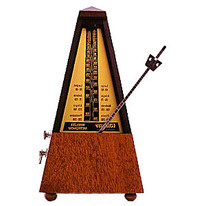 The dreaded metronome. (Image provided by Dorling Kindersley Clip Art.)
The dreaded metronome. (Image provided by Dorling Kindersley Clip Art.) Why is historical fiction relevant to modern children? History repeats itself (or so the cliché says). Lessons applicable to current events can be learned from the past. The last thing a fiction writer sets out to do is “teach a lesson” but the reader will learn something from the themes and emotions at a story’s heart. Empathy is a powerful emotion. Stories can offer readers windows into other worlds and help them develop empathy for the plight of the characters and, by association, for the plight of real people with similar problems. In my book, LIZZIE AND THE LOST BABY, Lizzie is a World War II evacuee, forced to live away from her home and family for the duration of the war. By placing themselves in Lizzie’s shoes children can imagine what it must be like to be forced to live away from homes and families. Perhaps those with stable secure homes will gain insight into the difficulties faced by immigrants and refugees.
Sadly we have ample examples every day of adults who lack empathy for others. We hear about religious litmus tests and walls to keep people out of this country. Read A FROST IN THE NIGHT by Edith Baer to see the result of bigotry and hatred in Hitler’s Germany. Read PAPER WISHES by Lois Sepahban to see the consequences of America turning against its Japanese citizens in World War II. Read LIZZIE AND THE LOST BABY to see the results of irrational bigotry against Gypsies (a bigotry that continues today).
Read THE BIRCHBARK HOUSE by Louise Erdrich to see the ravages that diseases brought by white immigrants wreaked on Native Americans. Read A LONG WALK TO WATER by Linda Sue Park to understand the history of the lost boys of the Sudan and the way that a limited water supply can prevent a young girl from being educated.
Read CHAINS by Laurie Halse Anderson for a compelling look at slavery at the beginning of the Revolutionary war. Read STELLA BY STARLIGHT by Sharon Draper to understand the terror caused by the KKK and the risks African Americans took to exercise their right to vote. Read ONE CRAZY SUMMER by Rita Williams Garcia and step into the Civil Rights struggle.
Perhaps the young readers who immerse themselves in these stories will look at we adults and think “we can do better.” That’s why historical fiction is important.
 RSS Feed
RSS Feed
